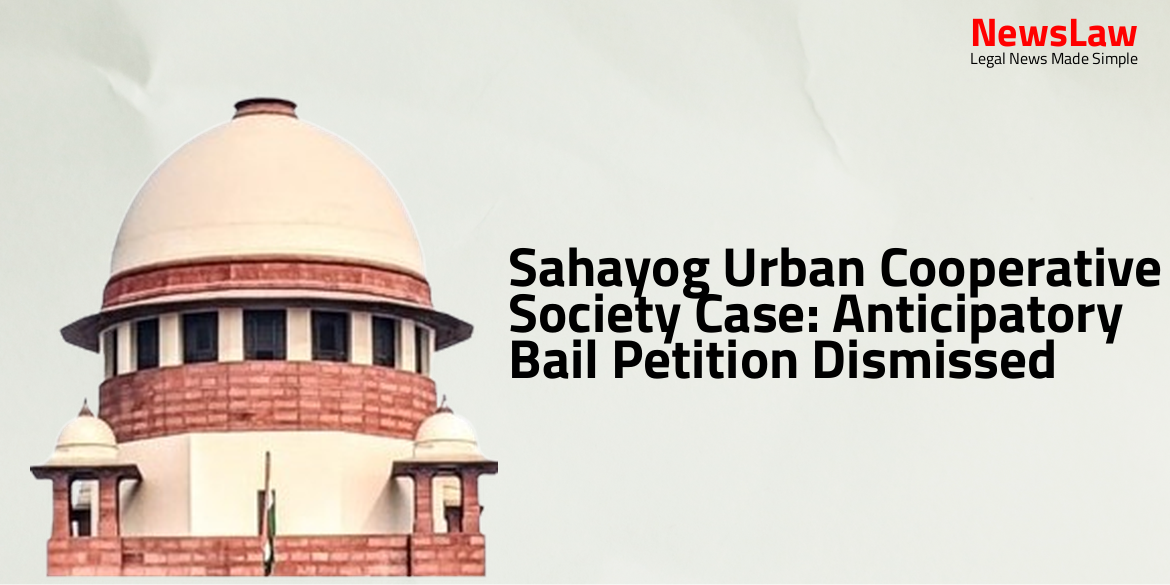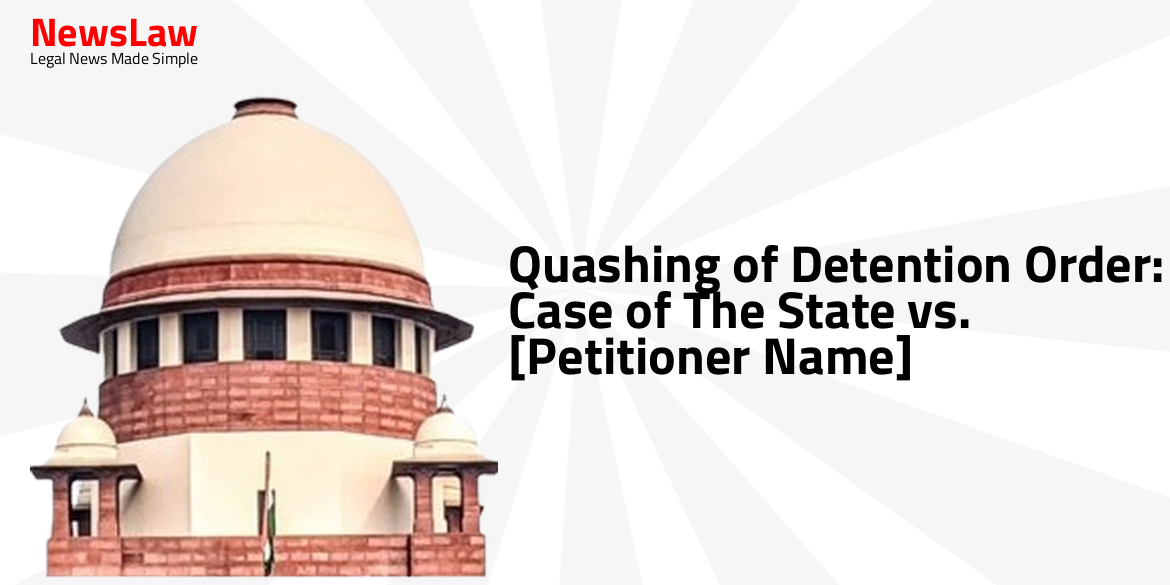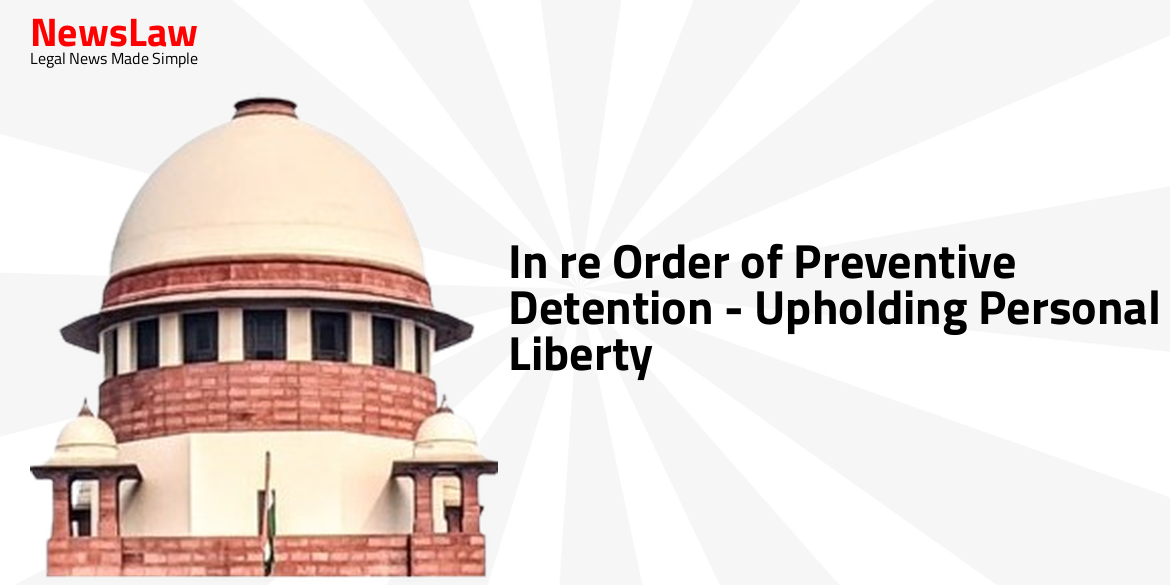The Gujarat High Court recently issued a significant judgement in the Sahayog Urban Cooperative Society case. The court dismissed the anticipatory bail petition in this case, impacting the ongoing investigations related to the allegations of fraud within the society. Stay informed about the latest developments in this legal matter.
Facts
- The Sahayog Urban Cooperative Credit and Consumer Society Limited is a registered cooperative society under the Gujarat Cooperative Societies Act, 1961.
- The Auditor appointed by the District Registrar, Cooperative Societies, conducted an audit for the period April 01, 2019, to March 31, 2023.
- No specific allegations of fund misappropriation or offenses have been made against the persons named in the special report by the Auditor.
- The Society acquires deposits from its members and provides loans to them, leading to audit classification as Class-B.
- The special report highlighting defects was prepared by Mr. H.V. Danecha, the Circle Auditor, District Registrar, Cooperative Societies, Surat.
- An FIR has been lodged based on the special report dated September 02, 2023, indicating issues within the society.
- The audit process examined the balance-sheet and books of accounts of the society for the mentioned period.
- The society’s office is located in Surat city, specifically at 405, 4th Floor, ABC/w, Sudama Chowk, Mota Varachha.
Arguments
- The petitioner’s advocate argues that the FIR is politically motivated and the petitioner did not siphon any funds from the Society.
- It is emphasized that the audit reports do not accuse the petitioner of defrauding the Society but rather show weak financial conditions.
- The petitioner followed resolutions of the Board of Directors regarding interest payments to known depositors.
- Allegations of wrongful expenses and causing losses to the Society are labeled as baseless and bald by the petitioner’s advocate.
- The advocate asserts that the alleged loss mainly occurred during the complainant’s presidency, not the petitioner’s involvement.
- The petitioner’s advocate distinguishes between causing loss to the Society and defrauding the Society, arguing that the former is the only accusation.
- The petitioner is established as a permanent resident with no criminal record and is willing to cooperate with the investigation.
- In contrast, the complainant’s advocate argues that the petitioner fabricated documents and used them fraudulently, constituting a prima facie case against the petitioner.
- The complainant’s advocate highlights the unique case where paying more interest to depositors is considered embezzlement by the petitioner.
- The complainant’s advocate requests the dismissal of the petition, supported by the arguments presented against the petitioner.
- The State’s advocate aligns with the complainant’s arguments, emphasizing the significant fraud amount involved and the active role played by the petitioner in the offense.
- The respondent’s argument is that the FIR in this case is filed based on the direction under Section 93 of the Act.
- The learned advocate suggests that if the FIR results from the audit report by the Registrar, Cooperative Societies, it should be seen as misfeasance rather than a criminal act, indicating unintentional actions by the petitioner.
- It is contended that specific allegations necessitate custody interrogation of the petitioner, implying the seriousness of the accusations against them.
- Based on the above points, the respondent requests the court to reject the petition filed by the petitioner.
Analysis
- Judicial discretion must be properly exercised after considering the nature and gravity of the accusation.
- Anticipatory bail should only be granted in exceptional cases for economic offences.
- Allegations of defrauding the Society for a significant amount over a specific time period are serious.
- Grant of anticipatory bail can hamper effective investigation in economic offences.
- The accused have allegedly hollowed the Society from within through fraudulent activities.
- The power under Section 438 of CrPC is an extraordinary remedy and must be sparingly exercised, especially in economic offences.
- Refusal to grant anticipatory bail does not amount to denial of rights under Article 21 of the Constitution of India.
- Prima facie actions of the petitioner are likened to an act of termite, indicating serious wrongdoing.
- Grant of anticipatory bail interferes with the investigation and should be approached cautiously, considering the scale of the alleged fraud.
- Grant of anticipatory bail may hamper the investigation.
- Power under section 438 of the Code is an extraordinary power and should be exercised sparingly in appropriate cases.
- Pre-arrest bail aims to strike a balance between individual’s personal freedom and the investigating agency’s right to collect relevant information.
- It may frustrate the investigating agency in interrogating the accused and collecting valuable information if the accused feels protected by the court’s order.
- Arrest is part of the investigative procedure not just to secure the accused’s presence but for various other reasons.
- Legislative intent behind Section 438 CrPC is to safeguard personal liberty and protect individuals from unnecessary police custody but without compromising societal interests.
- A delicate balance must be maintained between safeguarding individual liberty and societal interests.
- Judicial discretion in granting anticipatory bail is to be exercised by considering the nature and gravity of the accusation, possibility of the applicant fleeing from justice, and other relevant factors.
- The Court finds the present case unsuitable for granting the extraordinary relief of anticipatory bail.
- Granting bail to the petitioners would not assist their case.
- The discretion to grant anticipatory bail is not justified in this peculiar fact situation.
Decision
- The petition failed and was dismissed.
- The court found that the petitioner’s arguments were not compelling.
- The decision was based on the lack of evidence presented by the petitioner.
Case Title: VELJIBHAI RAJABHAI KATHIRIYA Vs. STATE OF GUJARAT
Case Number: R/CR.MA/7487/2024



